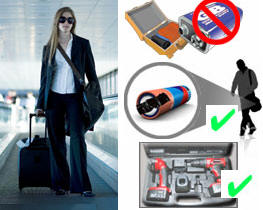
NEWSROOM
 |
NEWSROOM |
|
|
|
||||
|
DOT Issues
Lithium Battery Safety Advisory By Daniel Baxter |
||||
 |
October 7, 2009, Washington, D.C. – In its continuing effort to promote the safe transportation of lithium batteries, the Department of Transportation today issued a safety advisory in the Federal Register targeting shippers and carriers responsible for compliance with hazardous materials regulations covering both passenger and cargo aircraft. The Pipeline and Hazardous Materials Safety Administration, in coordination with the Federal Aviation Administration, published the advisory to highlight recent aviation incidents involving lithium batteries, outline the current regulatory requirements for the safe transportation of lithium batteries, and announce that the two agencies are stepping up enforcement of the safety standards. The agencies are particularly concerned with undeclared shipments of lithium batteries and in bringing enforcement action against those responsible for offering them in transportation. |
|||
|
“This advisory puts all shippers on notice that non-compliance with the safety regulations is not acceptable,” said Secretary Ray LaHood. “I have asked the department’s enforcement personnel to increase their inspections and step up enforcement where necessary.” Since 1991, more than 40 air transport-related incidents involving lithium batteries and devices powered by lithium batteries have been identified. Many of these incidents were directly related to the lack of awareness of the regulations, risks and required safety measures applicable to the shipment of lithium batteries. DOT's rule on lithium batteries in air travel, which took effect on January 1, 2008, prohibits carriage of spare lithium batteries in checked baggage, such as large suitcases you hand over to the airline for handling. If you put a portable electronic device in checked baggage, you may still do so with the batteries installed in the device. In carry-on baggage, you may still carry any number of some types of lithium batteries, such as the ones used in cell phones and most laptop computers, provided you take measures to protect terminals. You may also carry up to two more powerful batteries. You may pack spare lithium batteries in your carry-on baggage. If you pack a device containing batteries, secure it against activation by locking the activation switch in the "off" position, placing the device in a protective case, or by other appropriate measures. For personal use, there is generally no restriction on the number of spare batteries allowed in carry-on baggage. This is the case for cell phone batteries, "hearing aid" button cells, and AA batteries/AAA batteries available in retail stores, as well as almost all standard laptop computer batteries. |
||||
| ©AvStop Online Magazine Contact Us Return To News | ||||